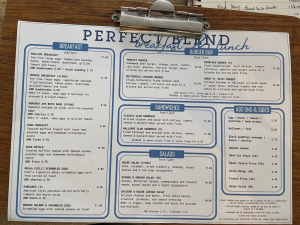I’m Mae, a sixth form student from South London, and as a part of my school’s work experience week, I’ve spent my time working with the End Child Poverty Coalition. The entire experience has been eye opening; seeing all the really important, but often hard to swallow, statistics and research done by the coalition, especially when I can see in real time how it’s impacting the people around me.
The first seventeen years of my life have been spent living in London, in Lambeth, a borough in the south of the city. As far as places go to grow up in, I don’t think I could have been luckier; it’s a truly incredible area, brimming with culture, community and an underlying sense of kindness that only comes from the mixing and mingling of people.
It’s unmissable, however, that there’s a huge disparity within London, rooted in generations of imbalance, that only continues to grow in the past few years. In the borough of Westminster, for example, the child poverty rate is 18.5%. Yet just a 20 minute tube journey away in Vauxhall, the rate is over double that, at 47.1%.
Earlier this week, in their Child Poverty Statistics, the End Child Poverty Coalition published that in my local area, Streatham, 7204 children, or 33.7%, were living in poverty in 2020-21. To put this into context, I imagined my class of 30 at school, and how that meant 10 of those students were growing up without access to the essentials for a decent standard of living. When I looked further into my school specifically, I found that in fact closer to half of my fellow students are living below the poverty line after housing costs, and yet only 22.5% are eligible for free school meals.*
Then at lunch earlier today, I was faced with £11.95 sandwiches and £4.95 juices on my local high street which for many is the only place to get food on a busy school day. This is just o ne example of failure; the type that leaves far too many children and families behind.
ne example of failure; the type that leaves far too many children and families behind.
The burdens of so many families in my area were lifted when the Universal Credit £20 increase was temporarily introduced between March 2020 and October 2021. It was a key factor as to why in many regions, including my own, child poverty dipped by over 1% for the first time in a decade! However, with the uplift now removed and the essentials becoming more and more unaffordable due to soaring fuel and housing costs, it can only be expected that we’ll see rises in the amounts of children and families going without. With the government having no specific child poverty action plan, or targets to be held accountable to, it is hard to see real improvement coming any time soon.
But it’s in circumstances like these, where governments have failed to put the needs of the most vulnerable at their forefront, that I have truly seen my community come together to make change. The Lambeth Cost of Living Package, for example, announced just a month ago, is a £4.3m programme drawn up by the council, that will fund summer free school meals, household bills and direct payments to support families really struggling to make ends meet. The Norwood and Brixton Foodbank are also working hard to get more and more food packages out, despite reporting a 137% increase in usage since pre-pandemic. And schools, like my own, are working hard to stop the stigmas associated with poverty for children, by ensuring opportunities are accessible to all, be they as big as residential trips, or as small as getting to actually choose your own free school meal at lunch.
As incredible as it is to see your local community working together in the cause against child poverty, that burden should not solely be placed on the backs of councils, charities and people themselves. Poverty is an issue that needs to be addressed directly by the government; by increasing welfare, ensuring that those who can work can live off what they earn, and by placing money into the pockets of those who need it most.
If you want to make that change you can email your MP here, and ask them to contact the Minister responsible for Universal Credit here.
*https://www.get-information-schools.service.gov.uk/Establishments/Establishment/Details/137093

